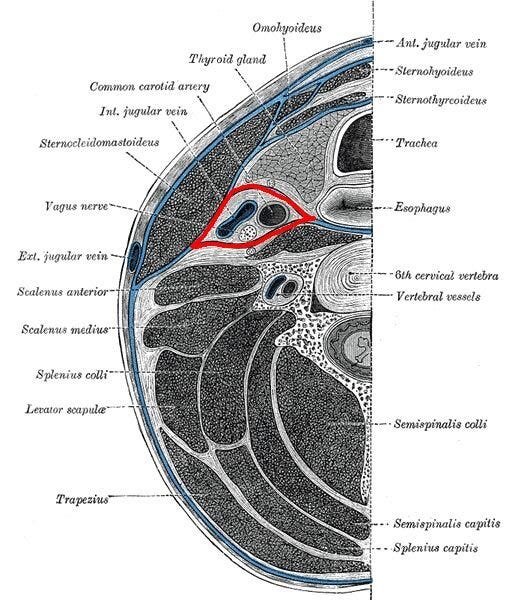Chronic Stress <-> Neck Problems <-> Breathing Issues <-> Low Dopamine <-> Chronic Symptoms...
A Connecting of the Dots...
Here are, I feel, some important connecting of the dots, or an exercise in medical science synthesis, by me. I believe the connections I’ve made here are quite important. In particular, these joined dots provide a plausible biological mechanism of how, by various feedback loops and vicious circles, we humans can get stuck in stress responses (fight, flight, or freeze).
The neck contains special sensory structures, called “carotid bodies”, which sense the chemistry (oxygenation) of the blood. These regulate oxygen levels in the blood, principally through activating stress responses and autonomic changes to breathing patterns.
The most important function of the carotid bodies is in ensuring adequate oxygenation of the brain, and preventing hypoxia [reduced or insufficient oxygen]. This includes maintenance of cerebral blood flow brought about by increasing systemic arterial pressure, or by altering breathing.
The primary reflex generated by the carotid bodes due to low oxygenation is profound bradycardia (slowing of the heart) and vasoconstriction (shrinking of the arteries), via activation of the oxygen preserving“Tonic Immobilization” type of freeze stress responses.
A secondary reflex response induce by the carotid bodies is activation of the fights or flight stress response, including hyperventilation.
The carotid bodies release and respond to dopamine. In fact, they are among the most dopamine rich cells in the human body, so much so that experiments in transplanting cells from a carotid body into the brain’s of folks with Parkinson’s provided significant symptom relief!
The role of dopamine in the carotid bodies is to de-activate the carotid bodies after they have been activated by a lack of oxygen event.
If the body does not produce enough dopamine, the carotid body may remain active, and hence stress responses switched on.
The carotid bodies also release and respond to adrenaline. If the body is generating adrenaline (stress response), it will not be able to produce enough dopamine, due to both the adrenaline being created by using up dopamine, and also the adrenaline competing for, and eating up, the same chemical building blocks as dopamine.
Stress can activate the carotid bodies. Chronic stress can chronically activate the carotid bodies.
The more the carotid bodies get activated, the more sensitive they become, and the easier they are activated the next time. Chronic stress can cause them to become overly sensitized and even to grow in size. It has even been suggested that surgical removal of part of the carotid body is a solution to chronic hypertension issues!
The neck in particular contains a lot of fascia structures, which can become restrictive, stiff, or compressive due to poor fascia health. These restrictions can impact or activate the carotid bodies in the neck, in turn impacting and activating breathing issues and stress states.
The neck is a primary site for body memories of traumatic events and stressful episodes to get written, resulting in fascia and muscles issues of the neck being common and chronic.
Stress itself causes a stiff neck, as it down-regulates the cranial nerves responsible for head turning.
Breathing problems can result in neck breathing, causing an over use of neck muscles, creating excessive muscle tone, or dystonia, of the neck.
Breathing problems, such as a frozen diaphragm, can result in hypoxia signalling, and can induce stress responses.
Stress can cause dys-regulated breathing, resulting in hyperventilation, frozen diaphragm, and chest/neck breathing.
So we can see how chronic stress, low dopamine, neck issues, breathing dysregulation, chronic symptoms, all go hand-in-hand-in-hand, and feedback on each other, and encircle each other. The resulting chronic activation of the carotid bodies, then with insufficient dopamine being produced to de-activate them, is a plausible biological mechanism by which we humans may get stuck in fight, flight, or freeze type responses due to chronic stressors.
For further details of this topic, and. in particular, pragmatic steps we can take to break these feedback loops and vicious circles, I have included a more detailed exploration in a new module for our Emotional Health, Fascia and Breathing course.


You can now also get this course, and my Nervous System in Chronic Illness course too, as part and parcel of the “complete package” course “Overcome Parkinson’s” which is due to start its second iteration in early November [also comes with Lilian’s “HOPE-shortcut” course, Biological Stress Test, and membership of our Community Area].







Great analysis!
It helps a lot to do lymph drainage to help the neck work better.
Also this is my favorite qi gong exercise that opens up the chest and loosens the neck.
https://youtube.com/watch?v=F7YENXCwPIo
That is fascinating! I’m so grateful for your work and the way you’re synthesizing these complex connections. As someone navigating complex PTSD, chronic stress, and the ripple effects on my neck and migraines, this research hits home.
The idea that the carotid bodies—so rich in dopamine—could be a key player in the cycle of chronic stress is such an important insight. The interplay between oxygen regulation, stress responses, and neurotransmitter depletion helps explain why it can feel impossible to break out of certain physiological states. That loop of stress activating the carotid bodies, which then drive further stress responses due to depleted dopamine, makes so much sense in the context of chronic stress disorders.
I also love the connection you’re making with fascia health—another underappreciated factor in chronic tension and nervous system dysregulation. The way the neck acts as a gateway for both mechanical and biochemical feedback loops makes me wonder how targeted interventions (like breathwork, vagus nerve stimulation, or even fascial release) could help break the cycle.
Thank you for diving all in on this! Your research is such a gift.